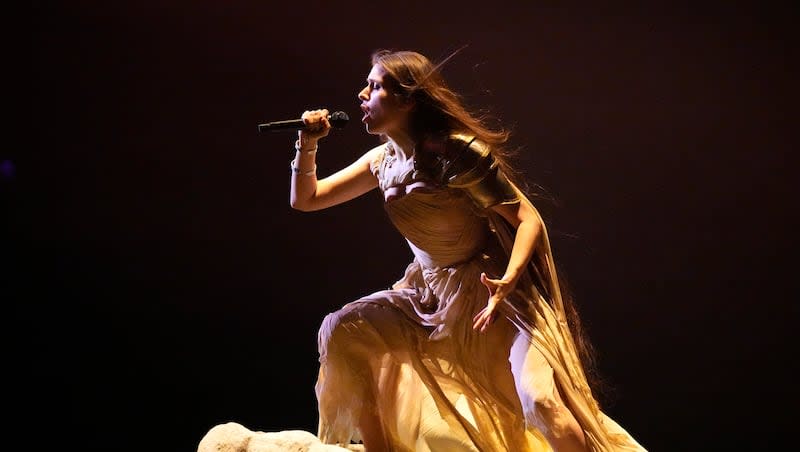Ukraine’s Eurovision song is about faith. What does it say?

- Oops!Something went wrong.Please try again later.
- Oops!Something went wrong.Please try again later.
The Eurovision contest, the annual glitzy pop-song fest that gave rise to stars like ABBA and Celine Dion, is ramping up in Malmo, Sweden, with nearly 37 participating European countries. The grand finale will take place on Saturday.
While all countries aim to entertain with flashy performances and light-hearted songs, Ukraine has entered the contest with a track that’s unusually symbolic and spiritual in meaning. The catchy, upbeat song “Teresa & Maria” features themes of faith and honors Mary, the mother of Jesus, and Mother Teresa. However, the song is less about religion, the artists explained, but more about faith, hope and female power.
“Personally, for me the song is primarily about how much has fallen on the shoulders of a woman, including the cliches and stereotypes,” said rapper alyona alyona, one of the performers, in an interview. “It’s hard for her, but she will claw her way out of this, because she’s strong. Also her strength is in the fact that she’s not alone — these women from above are giving them strength, faith and light. They were women just like her.”
The song is also dedicated to the female teachers at the school in Dnipro that was destroyed by Russian missiles in 2022, Euronews reported. The two artists performing the song — Jerry Heil and alyona alyona — are raising money to rebuild a school that was destroyed in the war.
With vocals by Ukrainian singer Jerry Heil (Yana Shemaieva) and fast-paced rap by the singer known as alyona alyona (Alyona Savranenko), the song features chanting in the Ukrainian language, folk melodies and poetic lyrics about Mary and Mother Teresa. “With us Mama Teresa, Diva Maria. All the divas were born as human beings,” goes the song. It continues: “No matter what, the world is on her shoulders, path is winding and rocky. But you should know: your own happiness is in your hands.”
Part of Ukraine’s dress rehearsal! 🇺🇦 pic.twitter.com/KalI0FrCaF
— Eurovision News (@EurovisionNewZ) May 6, 2024
The singers explained their intention in honoring two pivotal women in Christianity. “These women are symbols of spiritual purity; it’s more about that,” said Jerry Heil in an interview. “It’s not about religion, but about faith.” In a broader context, the song is about maintaining hope that Ukraine will triumph in its war with Russia. “If you are united, you can win the war,” alyona alyona told Euronews. “You can change the world and leave something for your children and the children of your children.”
The song has become something of an internet sensation with millions of views on YouTube. Both artists have music labels, released eight tracks together over the past year and traveled the United States on tour. To represent Ukraine at Eurovision, the duo first won the national contest with 62% of the votes in their support, which amounts to over 720,000 people. Ukraine and Croatia have been the two favorites this week among the bookmakers, and qualified for the grand final in Malmo, Sweden, according to Reuters.
The song’s religious themes have also spurred some backlash. Critics claimed that the singers shouldn’t be honoring Mother Teresa, given controversy over her work. But the artists responded that the song is not about Mother Teresa and her life, but more about the values she represented — kindness, compassion and love. “We are all born as human beings, so we make mistakes, but in the end, you are defined by your actions,” Heil said, according to Billboard.
Ukraine has won Eurovision three times before: in 2004, in 2016 and in 2022 with the song called “Stefania” by Kalush Orchestra. “Ukraine was the first country in the 21st century and the first Eastern European country to win the contest three times,” according to Euronews.

